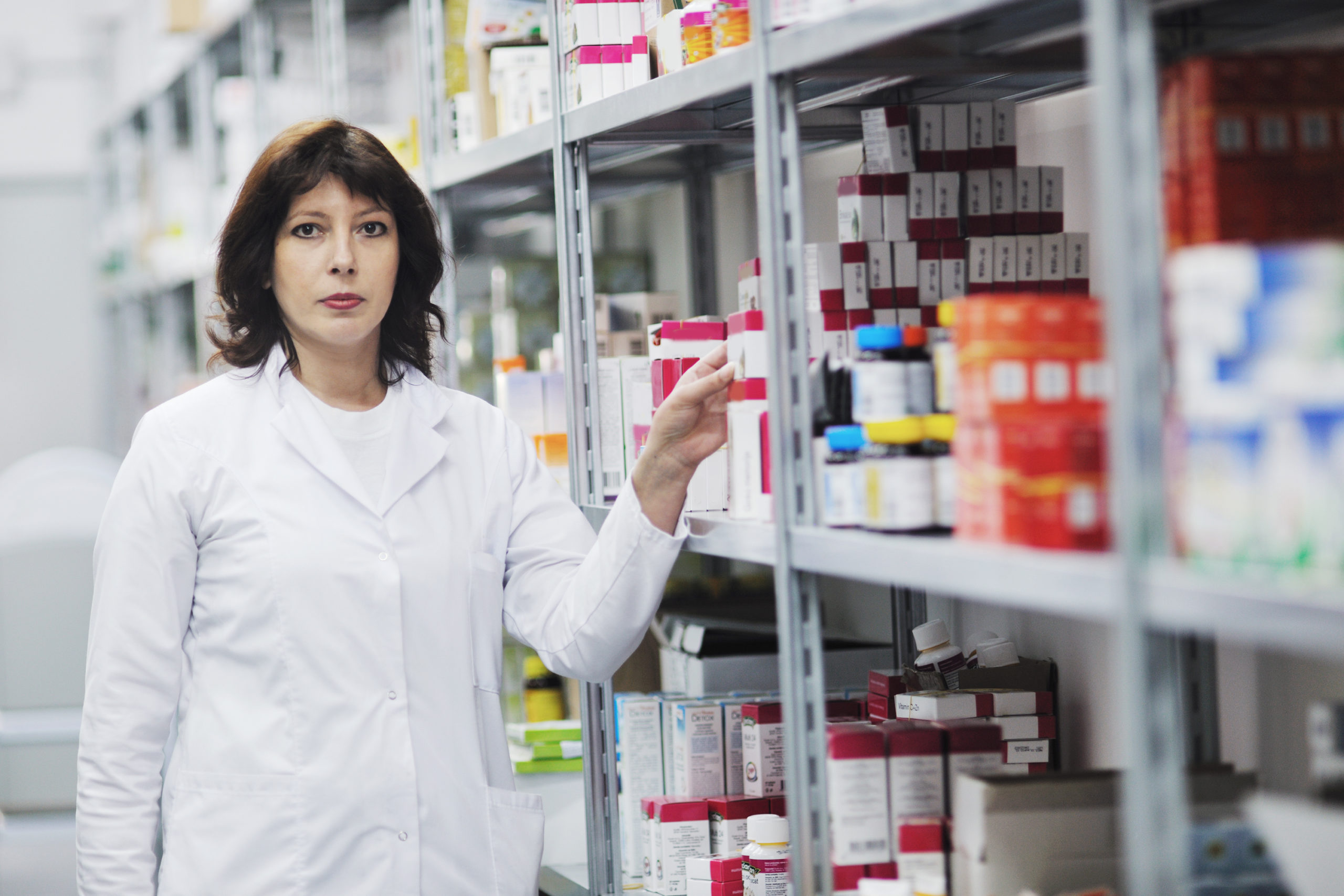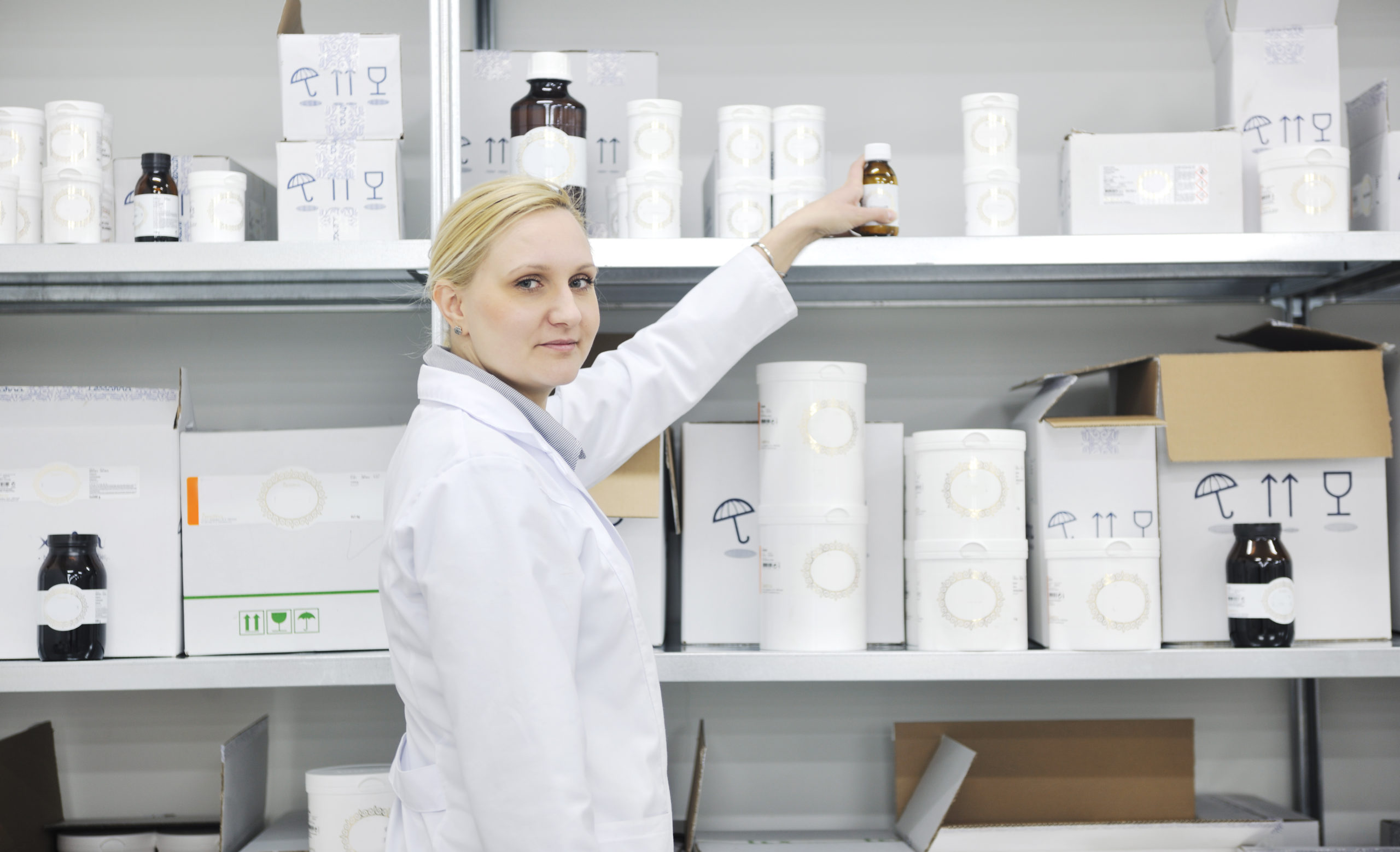Carrington’s Pharmacy Technology program provides both theory and practical training, which enables technicians, upon licensure*, to function as a competent entry-level assistant to a licensed pharmacist.
Courses cover topics including knowledge of pharmacy calculations, drug distribution systems, characteristics of drugs, and how to prepare sterile dosage forms.
The online degree program, which is only offered to graduates of the Certificate of Achievement program within the State of California,
includes a broad base of general education course offerings focusing on:
- Computer literacy
- English writing and composition
- Mathematics
- Science
- Social sciences
*States vary in terms of certification, licensure and scope of practice for pharmacy technicians. Generally, students must register with their state’s Board to become a pharmacy technician in-training. Timeframes for completion vary by state, but all states require that pharmacy technicians attain licensure.
Graduates of the Spokane program are approved to practice in the State of Washington.
Pharmacy technicians receive and fill prescriptions under the supervision of licensed pharmacists. Duties related to the daily operation of the pharmacy are often parts of the job, such as answering phones, creating prescription labels, maintaining patient profiles and prescription histories, completing cash register transactions, preparing insurance claim forms and inventory tasks.
Upon completion of the Pharmacy Technology program, graduates will be able to:
- Demonstrate the skills and knowledge necessary to function as a competent entry-level assistant to a licensed pharmacist
- Demonstrate the ability to apply critical thinking, collaboration, communication, and professionalism
Where can I take this course?
Carrington College’s Pharmacy Technology certificate program is available at 13 campuses in 6 states. To learn more about each location, explore their campus pages.
Albuquerque, NM
Boise, ID
Citrus Heights, CA
Mesa, Arizona
Phoenix, AZ
Pleasant Hill, CA
Portland, OR
Sacramento, CA
San Jose, CA
San Leandro, CA
Spokane, WA
Stockton, CA
Tucson, AZ
What is student life like on campus?
We know college is a big step. But education can be the first step in building a better future. Your instructors, administrators and fellow students are there to help if you ever hit a bump in the road along the way. Carrington College offers a lot of great student support services designed to help you succeed.
Student Finance
From scholarships and grants to loans, we will help you understand how to search and apply for financial aid.1
Tutoring and Study Groups
For help with schoolwork, your instructors and Student Success Center staff are often available for tutoring or you can join in an open student study group.
Fixed Tuition Promise
How would you like to know what you’re going to pay, right from the beginning? We promise your tuition won’t change through the length of your program. It’s our commitment to you.2
Externships, Clinical Rotations and Fieldwork
Most programs include an opportunity to learn in the real world before you even graduate! You’ll earn impressive experience that looks great on your resume.
Career Services
After graduation, we’ll help you with your career search with everything from resume writing help to job search support to interview tips.
What are the expected career outcomes from this program?
Pharmacy technicians fill prescription medications and dispense it to customers or health professionals. Between 2018 and 2028 employment for pharmacy technicians is expected to grow 7% nationally, faster than the average for all occupations, according to the Bureau of Labor Statistics.3
The national media salary for a pharmacy technician was $32,700 per year or $15.72 per hour in May 2018.3 For detailed regional information please visit https://www.bls.gov/oes/current/oes292052.htm#st.
Pharmacy technicians work in pharmacies in grocery stores or hospitals. Most work full time, while others work part time to help fill in for holidays and busy seasons.
Program Disclosures
Your Prescription for Success is at Carrington College.
In Carrington College’s Pharmacy Technology program, you’ll receive a combination of classroom instruction and hands-on experience. When you complete the program, you should be prepared to put your skills to use as a pharmacy technician. Our program is built to give you the information and experience you need to be able to:
Receive, prepare and dispense prescriptions
Verify prescription information
Maintain customer profiles and patient histories
Prepare for the Certified Pharmacy Technician (CPhT) national certification exam4
What is the cost of the program?
Education is a major investment, but it’s an investment in your future. Every student comes to Carrington with unique financial needs. Carrington College is committed to helping you achieve your education goals. We participate in most financial assistance programs, both federal and state, as well as private financing. Each program has different requirements and application instructions. Student loans, grants, and scholarships are available to those who qualify.
For complete information on current tuition costs, please see the Academic Catalog.
The best way for us to understand your financial needs is to meet in person. Call (602) 492-1086 to set an appointment with our Student Finance Department so we can help you develop your personalized financial plan to achieve your educational goals.
How to Become a Pharmacy Technician
Do you like working in a team? Are you interested in health care? Do you still want to interact with customers and people every day? If you said yes, an exciting career as a pharmacy technician may be right for you. This useful guide explains why become a pharmacy technician, how to do so, and how to choose the right pharmacy technician school for you.
Why Become a Pharmacy Technician?
Pharmacy technicians hold a unique place in health care in that they can work in a variety of settings. They get to interact with customers as well as doctors, pharmacists and other medical professionals.
Employment in the health care sector overall is one of the strongest growth areas in the United States. According to the Bureau of Labor Statistics, employment of health care occupations is projected to grow 14% from 2018 to 2028, much faster than the average for all occupations, adding about 1.9 million new jobs.1 Pharmacy technicians specifically are also a growing area of employment. According to the BLS, the national job outlook is a growth of 7%, faster than average for all occupations.2
The BLS states that the demand for health care workers and pharmacy technicians is high because of the aging U.S. population. As the baby boomer generation gets older, there is more demand for preventive medicine. Higher rates of chronic diseases, such as diabetes, among all age groups will also lead to increased demand for prescription medications. Advances in pharmaceutical research will allow for more prescription medications to be used to fight diseases.2
According to the BLS, pharmacy technicians will also play an important role as the role of pharmacists changes. Pharmacists are more frequently working with patients, administering things like flu shots. As such, technicians will need to perform tasks — such as collecting patient information, preparing more types of medications, and verifying the work of other technicians — that were previously done by pharmacists.2
Pharmacy Technician Salary
The national median salary for pharmacy technicians was $33,950 or $16.32 per hour in May 2019.3 The lowest 10% earned less than $24,120, and the highest 10% earned more than $49,130. In May 2019, the median annual wages for pharmacy technicians in the top industries in which they worked were as follows:
Hospitals; state, local, and private: $38,310
Pharmacies and drug stores: $31,840
Food and beverage stores: $31,610
Start Your Career as a Pharmacy Technician
pharmacy technician behind counter holding a box
Carrington College focuses on small class sizes and hands-on training. Here you’re more than a face in a room. Take the first step on your way to a new career in pharmacy technology.
Learn More >
Where Do Pharmacy Technicians Work?
While many have likely interacted with a pharmacy technician at a retail pharmacy like CVS or Walgreens the last time they were sick, there are other places pharmacy techs can work. Some of those options can include:
Pharmacies, including compounding and specialty pharmacies
Pharmaceutical companies
Hospitals and other health care clinics
Compounding pharmacies differ from retail drugstores in that they create medications tailored to individual patients.5 A doctor may refer a patient to a compounding pharmacy for specific medication that is tailored to a patient’s needs. Or, if a patient is allergic to certain ingredients like glutenin a medication their doctor may refer them to a compounding pharmacy.
Meanwhile, pharmacy technicians work in drug-dispensing departments of larger organizations, such as hospitals, clinics, and long-term care facilities, such as nursing homes, assisted living communities, and memory care facilities. At these sorts of facilities, pharmacy technicians may help with medication administered in IV bags or syringes.
Overall, pharmacy technicians in all settings typically work full-time and indoors. Because pharmacy hours are typically longer, pharmacy technicians may need to work nights or weekends.6
Major Pharmacy Technician Employers
If you’re looking for pharmacy technician jobs, there are a number of major retailers nationally. The 15 largest pharmacies in 2018 were:7
CVS Health
Walgreens Boots Alliance
Cigna/Express Scripts, Inc.
UnitedHealth Group
Walmart Stores
The Kroger Company
Rite Aid Corporation
Humana Pharmacy Solutions
Albertsons Companies
Diplomat Pharmacy
Costco Wholesale Corporation
PharMerica
Publix
Ahold Delhaize
H-E-B
These chains, which primarily are made up of retail pharmacies and food and beverage stores that may have pharmacies inside them.
pharmacy technician with bottle of medication
What Does a Pharmacy Technician Do?
Pharmacy technicians assist pharmacists and interact with patients, helping people get the medications they need. Some common job duties of a pharmacy tech may include:8
Collect information needed to fill a prescription from customers or health professionals
Measure amounts of medication for prescriptions
Package and label prescriptions
Organize inventory and alert pharmacists to any shortages of medications or supplies
Accept payment for prescriptions and process insurance claims
Enter customer or patient information, including any prescriptions taken, into a computer system
Answer phone calls from customers
Arrange for customers to speak with pharmacists if customers have questions about medications or health matters
Overall, pharmacy technicians work under the supervision of a pharmacist who reviews medication before it is delivered to a patient. Exact duties of pharmacy technicians are regulated by individual state laws and store policies. Most states allow technicians to compound or mix some medications and call physicians for prescription refill authorizations.7
How to Become a Pharmacy Technician
There are different paths to becoming a pharmacy technician depending on the state in which you live and wish to work. Many states require pharmacy technicians to register with a state board. Paths to registration can vary but typically, to become a pharmacy technician there are a few steps.
Have a high school diploma or equivalent. Most states require a high school education.
Attend a qualified Pharmacy Technology program. The easiest way to become a pharmacy technician is to attend an accredited program that will prepare you for the Pharmacy Technicians Certification Board (PTCB) exam.
Receive hands-on training. Many states require some level of on-the-job training before pharmacy technicians can register with the state.
Become PTCB certified. This step is not required in all states.
How to Get PTCB National Certification
PTCB national certification is a step that may be required by your state, as seen in the table below, it is commonly a path to becoming a registered pharmacy technician. The Pharmacy Technicians Certification Board (PTCB) is a national certifying organization for pharmacy technicians. PTCB-certified technicians are called Certified Pharmacy Technicians or CPhTs.
There are two paths to becoming PTCB certified.9 One is to attend a PTCB-recognized program, of which there are 1,400 recognized programs. The second path is to receive equivalent work experience (minimum 500 hours) under. Following that training, prospective CPhTs need to take and pass the PTCB Pharmacy Technician Certification Exam® (PTCE®).
Other eligibility requirements are:
Full disclosure of all criminal and State Board of Pharmacy registration or licensure actions
Compliance with all applicable PTCB Certification policies
pharmacy technician and woman
What to Look for in a Pharmacy Technology Program
Choosing the right pharmacy technology program for you is a big decision. The right training can open doors for better jobs and possibly salary down the line. While many institutions may offer pharmacy technology classes, it’s important that you look for the one that fits your goals and lifestyle.
A few core things to look for when considering Pharmacy Technology programs include:
Small class sizes. When learning to be a pharmacy technician you want individual attention from your instructor.
Hands-on training. When dealing with tasks like measuring dosages and administering medication, it’s important that you have time to practice those skills hands-on.
Externships or career training. Most programs include an opportunity to learn in the real world before you even graduate! You’ll earn an impressive experience that looks great on your resume. What’s more, many states require some form of supervised training to become a registered pharmacy technician.
Career support. Programs and schools should be dedicated to your success. Many institutions, like Carrington College, offer career services to help you find job placements after graduation.
Cost. Education is a major investment, but it’s an investment in your future. At Carrington College and many other institutions, we participate in most financial assistance programs, both federal and state, as well as private financing. Student loans, grants, and scholarships are available to those who qualify. For complete information on current tuition costs, please see the academic catalog.
How Long Does it Take to Become a Pharmacy Technician?
Pharmacy Technology programs can take as little as nine months to complete or as many as two years if you are also pursuing an associate’s degree. When looking for the right pharmacy technology school for you, you should look at when you would be able to complete your certificate program. Everyone’s timeline for pursuing a new career is different. Find a school that works best for you.
What Classes Would You Take in the Carrington College Pharmacy Technology Program?
In a pharmacy technology program, you will learn a number of skills related to compounding, dosing and administering medications. It will be important to study human anatomy and physiology as well as the theory of how to work in a lab. Some course examples are:
PHM 111 L Retail Operations Lab This course provides hands-on lab experience with shelf stocking, ordering systems and retail operations such as pulling and filling medication orders and packaging prescriptions for verification by pharmacists. Students also perform reconstitutions of antibiotics and become proficient in understanding drug labels and equipment used in dosage measurement. Retail pharmacy procedures, calculations and cash register operations are practiced in simulations.
PHM 112 L Prescription Processing and Pharmacy Calculations Lab This course provides hands-on lab experiences that allow students to work with software used in a pharmacy setting. Students enter mock patient profiles, prescriptions and physician information in addition to printing medication labels and filling prescriptions for verification by the pharmacists. Students will also work in a group setting to research the legalities to open a pharmacy, from the type of building required to startup costs. Students will transcribe handwritten paper prescriptions into pharmacy specific computer software using basic keyboarding techniques and 10-key touch-typing methods.
PHM 114 T Compounding, Pharmacy Calculations and Body Systems Theory This course introduces students to specialized patient dosage calculations, conversions between measurement systems and utilizing ratio proportion for pharmaceutical calculations in context. Also provided is an overview of the anatomy, physiology and pharmacological effects of medications on the respiratory, digestive and renal systems. Students gain a working knowledge of the medications used to treat common diseases in all three systems, including mechanisms of action, common interactions and dosing considerations.
Discover Your Career as a Pharmacy Technician
smiling pharmacy technician
Carrington College’s Medical Assisting Program offers you the hands-on training you need for a job in pharmacy technology. Take the first step on your way to a new career.
Learn More >
Launch a Career in Pharmacy Technology With Carrington College
Carrington College offers a top-tier Pharmacy Technology program for students interested in taking their careers in this exciting direction. Carrington’s program focuses on small classes so you can get individualized attention from knowledgeable faculty and staff. Carrington is committed to student success, helping students with externships and job placement.
Carrington College’s Pharmacy Technology Students and Faculty
Carrington hires experienced staff who have working knowledge of their field. Students and faculty work hard to make sure there are excellent student outcomes.
Carrington students range from high-school graduates expanding their educational horizons to more mature students who are making career shifts. They all work together to find new careers.
Our faculty take pride in seeing students succeed, often taking a personal interest in if a student gets a training placement or externship. At Carrington, you aren’t just a nameless face in a classroom; you can build real relationships with educators.
Find Pharmacy Technology Programs Near You
Carrington College’s Pharmacy Technology program is available at 13 locations in Arizona, California, Idaho, New Mexico, Oregon, and Washington. Find the right campus for you or request more information.



